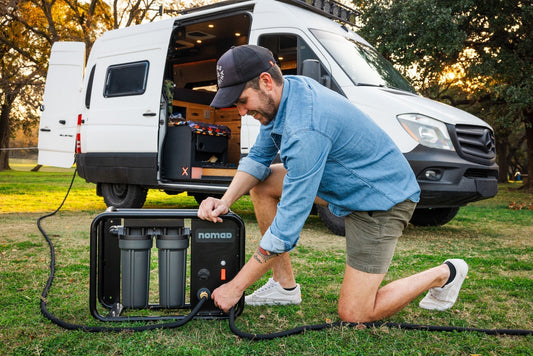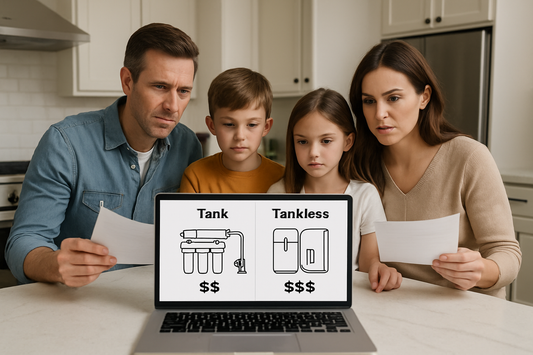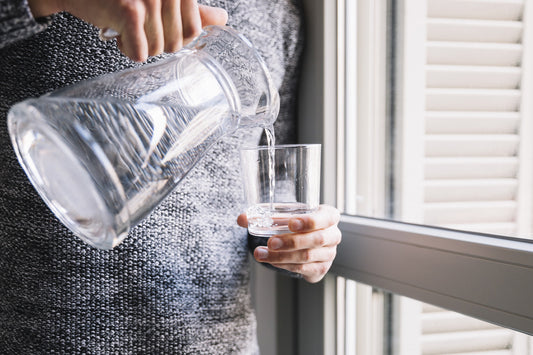Picture this: You're filling up your child's water bottle from the kitchen tap, and suddenly you notice a strange metallic taste. Or maybe you've caught a whiff of that unmistakable sulfur smell wafting from your bathroom faucet. If you're one of the 43 million Americans relying on well water, these scenarios might feel all too familiar—and frankly, a little unsettling.
Here's the truth that many well water families don't realize: What flows from your private well isn't automatically safe, even if it looks crystal clear. Unlike city water that's treated and monitored, your well water is entirely your responsibility. But don't worry—we're here to help you navigate the world of well water filtration systems and give you the peace of mind every family deserves.
Why Your Family's Health Depends on Proper Well Water Filtration
Let's start with what really matters: your family's wellbeing. While well water often tastes better than chlorinated city water, it can harbor invisible threats that put your loved ones at risk.
The Hidden Dangers Lurking in Untreated Well Water:
Raw well water can contain harmful bacteria like E. coli and coliform, heavy metals such as lead and arsenic, nitrates from agricultural runoff, and volatile organic compounds (VOCs) from nearby industrial activity. These contaminants don't always announce themselves with bad tastes or odors—they can be completely undetectable while slowly impacting your family's health.
Imagine serving your family water that contains bacteria levels unsafe for drinking, or worse, discovering years later that your children have been exposed to lead or other toxic substances. It's a parent's nightmare, but it's also completely preventable with the right water filtration system for well water.

Image by Atlascompany
The Life-Changing Benefits of Well Water Filtration
When you invest in a quality water well filtration system, you're not just improving your water—you're transforming your entire home experience.
Immediate Health Protection: Your family drinks, cooks, and bathes in water free from harmful contaminants. This means fewer stomach issues, reduced risk of waterborne illnesses, and protection from long-term health effects of heavy metal exposure.
Better-Tasting Everything: From your morning coffee to your evening pasta, everything tastes better when made with clean, filtered water. Your family will actually want to drink more water, supporting their overall health and hydration.
Appliance Protection: Unfiltered well water is tough on appliances. Minerals and sediments can clog your dishwasher, reduce your water heater's efficiency, and leave unsightly stains on fixtures. A good filtration system extends the life of everything that touches your water.
Confidence in Every Drop: There's something incredibly reassuring about knowing that every glass of water your family drinks is pure and safe. It's peace of mind you can't put a price on.
How to Filter Well Water: The Complete Process Explained
Understanding how to filter well water effectively requires knowing what you're up against. Every well is unique, which is why cookie-cutter solutions often fall short.
Step 1: Know Your Enemy (Water Testing) Before you can solve the problem, you need to understand it. Professional water testing reveals exactly what contaminants are present in your well water. Common culprits include iron, manganese, hydrogen sulfide (that rotten egg smell), bacteria, nitrates, and hardness minerals.
Step 2: Multi-Stage Filtration Process The most effective water filtration systems for well water use a multi-stage approach:
- Sediment Filtration: Large particles like sand, silt, and rust are trapped first
- Carbon Filtration: Removes chlorine, organic compounds, and improves taste and odor
- Specialized Treatment: Iron filters, water softeners, or reverse osmosis depending on your specific needs
- UV Sterilization: Kills bacteria, viruses, and other microorganisms
- Final Polishing: Ensures every drop meets the highest standards
Step 3: Proper Installation and Maintenance Even the best system won't protect your family if it's not properly installed or maintained. Professional installation ensures optimal performance, while regular maintenance keeps your system running smoothly for years to come.

Image by freepik
Solving Common Well Water Problems
How to Remove Sulfur Smell from Well Water
That distinctive rotten egg smell isn't just unpleasant—it's embarrassing when guests visit and concerning for your family's daily comfort. The good news? How to remove sulfur smell from well water is straightforward with the right approach.
Hydrogen sulfide gas causes that sulfur smell, and it requires specific treatment methods. An oxidation filter or aeration system can effectively eliminate the odor, while a carbon filter provides additional polishing. For severe cases, chlorine injection followed by carbon filtration delivers professional results.
Dealing with Iron Stains and Metallic Taste
Iron in well water leaves rusty stains on fixtures, gives water a metallic taste, and can even stain your laundry. Iron filters specifically designed for well water applications can remove both dissolved and oxidized iron, restoring your water's clarity and taste.
Addressing Hard Water Issues
Hard water doesn't just make soap less effective—it can dry out skin and hair, leave spots on dishes, and create scale buildup in pipes and appliances. A quality water softener integrated into your well water filtration system solves these problems while extending appliance life.
Choosing the Right System for Your Family
With so many options available, selecting the perfect water filtration system for well water can feel overwhelming. Here's how to make the right choice:
Consider Your Family's Size and Usage A family of four uses approximately 300 gallons of water per day. Your system needs to handle peak demand periods, like busy mornings when everyone's getting ready for work and school simultaneously.
Match Treatment to Your Water Quality Generic systems rarely address your specific water quality issues effectively. Professional water testing reveals exactly what contaminants need to be removed, allowing you to choose targeted treatment methods.
Think Long-Term Value While the initial investment in a quality system might seem significant, consider the long-term savings. You'll spend less on bottled water, appliance repairs, and potential health issues. Plus, a whole-house system adds value to your home.
Professional Installation vs. DIY While some homeowners tackle installation themselves, professional installation ensures proper sizing, optimal performance, and warranty protection. It's an investment in your family's safety that pays dividends in reliability and peace of mind.

Image by freepik
Maintenance: Keeping Your Family Protected
Your water well filtration system is only as good as its maintenance. Regular upkeep ensures consistent performance and extends system life.
Monthly Tasks: Check system pressure, inspect for leaks, and monitor water quality indicators.
Quarterly Tasks: Replace sediment filters, clean system components, and test water quality.
Annual Tasks: Professional system inspection, UV lamp replacement, and comprehensive water testing.
Signs Your System Needs Attention: Changes in water taste, odor, or appearance; decreased water pressure; unusual system noises; or visible sediment in filtered water.
The Bottom Line: Your Family's Health is Worth It
Investing in quality well water filtration systems isn't just about better-tasting water—it's about protecting what matters most. Your family's health, your home's value, and your peace of mind all depend on the quality of water flowing through your pipes.
Every day you delay is another day your family might be exposed to preventable contaminants. But with the right system in place, you can rest easy knowing that every drop of water in your home meets the highest standards of safety and quality.
Don't leave your family's health to chance. Take control of your water quality today and give your loved ones the protection they deserve.





